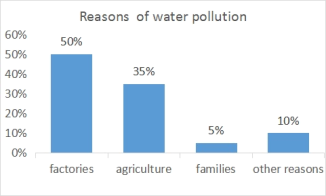1. 水污染的原因描述;
2. 水污染的危害;
3. 你的建议。
注意:
1.词数80左右;2.首句已给出,不计入总词数。

With the development of society, water pollution is getting more and more serious.
__________________________________________________________________________________________________________________________________________________________________________________________________________________________________________________________________________________________________________________________________________________________________________________________________________________________________________________________________2 . Pollution is one of the biggest problems in the world today. In many places, rubbish is thrown into lakes and rivers.
In some cities, the air is filled with pollution.
If we do not act to improve the environment, more living things will be killed by pollution.
If we can do these, we will make the world a better place to live in.
| A.This makes some old people and children ill. |
| B.As well as people, animals are also harmed by pollution. |
| C.We can make our lakes and rivers cleaner and cleaner. |
| D.It’s time for all of us to take action right away! |
| E.Because of this, these places have already been polluted. |
| F.Trees reduce dust and help keep the air clean. |
| G.A few of us should take action to protect the environment. |
3 . In recent years, Ethiopia has become a regional leader in solid waste management. Last year, the country transformed the landfill (垃圾填埋场) in Addis Ababa into a new waste-to-energy plant, the first such project on the continent. The plant incinerates up to 1, 400 tonnes of waste every day, about 80 percent of the city's rubbish, supplying the capital with 25 percent of its household electricity needs.
However, despite these important steps, challenges remain in Ethiopia. Although the country has permitted the Basel, Stockholm and Rotterdam conventions, laws and policies for environmentally sound management of hazardous (有害的) wastes are still not effective in pre- venting littering waste illegally.
To help Ethiopia meet these challenges, the Chemicals and Waste Management Program is supporting the country with a three-year project to enhance its capacity for sound management of hazardous wastes.
In the initial stages, a project management unit will be formed, made up of many representatives from government departments and private organizations. This unit will be responsible for reviewing and assessing Ethiopia's current legal system, which, despite numerous advances in recent years, does not specifically target the recycling of hazardous waste. Once legal gaps are identified, the project will seek to update existing policies and strategies.
Many people in Ethiopia are not aware of the possible effect of environmental damage and the need to report such crimes to the police. To resolve this pressing issue, Ethiopia will be conducting a series of capacity-building activities, including creating awareness-raising programs, training trainers and providing equipment.
Ethiopia will also work to establish a national mechanism for chemicals and waste management by engaging government departments and civil society groups. Authorities will also make budgetary provisions (预算拨款) in national, regional and institutional planning to ensure funding for these activities is sustainable even after the project's completion.
1. Which can replace the underlined word “incinerates” in paragraph 1?| A.Produces. | B.Burns. | C.Gathers. | D.Absorbs. |
| A.The relevant laws are not sound. | B.The shortage of workers is severe. |
| C.The pollution level is too high. | D.The funds are not sufficient. |
| A.Restrict their environmental movement. | B.Call on them to start some programs. |
| C.Reward them with budgetary provisions. | D.Raise their environmental awareness. |
| A.Ethiopia is facing serious environmental problems. |
| B.Ethiopia has achieved success in waste management. |
| C.Ethiopia is putting efforts into waste management. |
| D.Ethiopia has reduced environmental pollution levels. |



